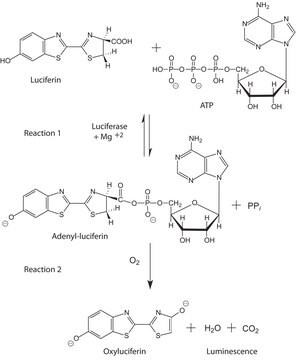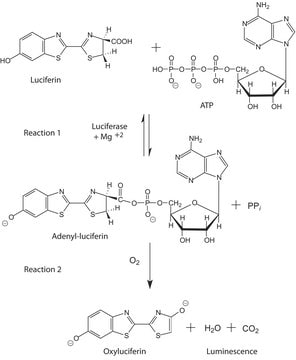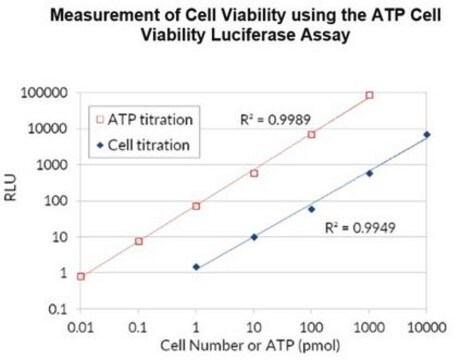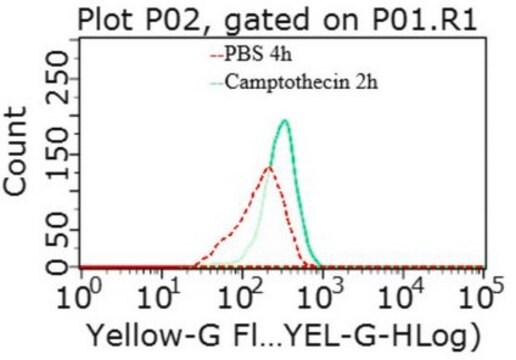FLASC
Adenosine 5′-triphosphate (ATP) bioluminescent somatic cell assay kit
for cellular ATP determination
Synonym(s):
ATP bioluminescence assay kit
Sign Into View Organizational & Contract Pricing
All Photos(1)
About This Item
UNSPSC Code:
12352202
eCl@ss:
32160414
NACRES:
NA.26
Recommended Products
storage temp.
−20°C
General description
Adenosine 5′-triphosphate (ATP) bioluminescent somatic cell assay kit may be employed for the bioluminescent determination of adenosine 5′-triphosphate (ATP) released from a suspension of viable somatic cells. Estimates of cell concentrations may be calculated if it is assumed that the ATP content per viable cell remains constant. The number of viable somatic cells are selectively counted because, as a cell dies, its ATP is rapidly degraded.
Application
The Adenosine 5′-triphosphate (ATP) bioluminescent somatic cell assay kit has been used to determine accurately the level of ATP present in neutrophils isolated from the blood of over 100 human test patients.
Kit Components Only
Product No.
Description
- FL-AAB Dilution buffer 1 mL/vial
- FL-AAM Assay mix 1 mL/vial
- FL-AAS ATP standard 1 mL/vial
- FL-SAR Somatic cell releasing reagent 1 mL/vial
Signal Word
Danger
Hazard Statements
Precautionary Statements
Hazard Classifications
Aquatic Acute 1 - Aquatic Chronic 2 - Eye Dam. 1
Storage Class Code
10 - Combustible liquids
Choose from one of the most recent versions:
Already Own This Product?
Find documentation for the products that you have recently purchased in the Document Library.
Customers Also Viewed
Linqing Zhen et al.
Reproductive toxicology (Elmsford, N.Y.), 59, 66-79 (2015-11-20)
Hexavalent chromium reportedly induces reproductive toxicity and further inhibits male fertility in mammals. In this study, we investigated the molecular mechanism by which hexavalent chromium affects motility signaling in boar spermatozoa in vitro. The results indicated that Cr(VI) decreased sperm
Y Zhao et al.
Redox biology, 12, 129-138 (2017-02-24)
The signaling of reactive oxygen species (ROS) is essential for the maintenance of normal cellular function. However, whether and how ROS regulate stem cells are unclear. Here, we demonstrate that, in transgenic mice expressing the human manganese superoxide dismutase (MnSOD)
Li Xinhong et al.
Theriogenology, 116, 71-82 (2018-05-21)
The reproductive efficiency of Meishan pigs is higher than that of Duroc pigs, but the underlying molecular mechanism for this disparity remains unclear. No systematic quantitative proteomics studies, comparing global proteins in Meishan and Duroc boar spermatozoa have been reported.
Sarah Myhill et al.
International journal of clinical and experimental medicine, 2(1), 1-16 (2009-05-14)
This study aims to improve the health of patients suffering from chronic fatigue syndrome (CFS) by interventions based on the biochemistry of the illness, specifically the function of mitochondria in producing ATP (adenosine triphosphate), the energy currency for all body
Rahul Vijay Kapoore et al.
The Analyst, 142(11), 2038-2049 (2017-05-13)
Metabolome characterisation is a powerful tool in oncology. To obtain a valid description of the intracellular metabolome, two of the preparatory steps are crucial, namely washing and quenching. Washing must effectively remove the extracellular media components and quenching should stop
Our team of scientists has experience in all areas of research including Life Science, Material Science, Chemical Synthesis, Chromatography, Analytical and many others.
Contact Technical Service







